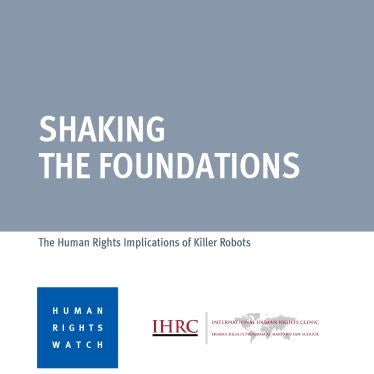(Washington, DC) - The United States should commit to join the international treaty banning antipersonnel landmines when it attends a milestone meeting of the agreement beginning November 29, 2009, Human Rights Watch said today.
For years the US has obeyed most of the key provisions of the Mine Ban Treaty - no use, no production, and no trade - while strongly supporting international programs to get mines out of the ground and to help victims. But it has not acceded to the treaty.
"It's time for the US to turn its landmine practice into policy," said Steve Goose, Arms Division director at Human Rights Watch. "President Obama and Secretary of State Clinton should instruct officials who plan to be at the meeting to confirm publicly that the US is committed to joining the Mine Ban Treaty in the near future."
The US has not used, produced, or exported antipersonnel mines in the 12 years since the Mine Ban Treaty was established in 1997. That year, the Clinton administration set the objective of joining the Mine Ban Treaty in 2006, but the Bush administration reversed course in 2004.
The Obama administration has not yet taken a position on the landmine ban, but in mid-November the US registered to attend the Second Review Conference of the Mine Ban Treaty. It will be the first time that the US has been officially represented at a formal meeting of the treaty. More than 100 governments are expected to attend the high-level event in Cartagena, Colombia, also known as the "Cartagena Summit on a Mine-Free World."
"Engaging with its allies under the framework of the Mine Ban Treaty is a positive step, but the US should not arrive empty-handed in Cartagena," Goose said. "The US needs to come to the table expressing a sincere commitment to relinquish this weapon and join the treaty."
A total of 156 nations are party to the Mine Ban Treaty, and another two countries have signed but have not yet ratified. Nearly all of the 37 states that have not yet joined are in de facto compliance with most of the treaty's provisions. According to Landmine Monitor Report 2009, an annual survey issued on November 12 by Human Rights Watch and other members of the International Campaign to Ban Landmines (ICBL), significant progress has been made in eradicating antipersonnel mines since the Mine Ban Treaty took effect:
- Global use, production, and trade of antipersonnel mines have been dramatically curtailed;
- Some 3,200square kilometers of land has been cleared of mines and explosive remnants of war;
- The number of new mine and explosive remnants of war casualties has significantly reduced each year, down to 5,197 recorded casualties in 2008, compared to an estimated 26,000 recorded and unrecorded casualties per year in the 1990s; and
- More than 44 million stockpiled antipersonnel mines have been destroyed by states party to the Mine Ban Treaty.
Human Rights Watch is a founding member of the International Campaign to Ban Landmines, which received the 1997 Nobel Peace Prize for its efforts to bring about the Mine Ban Treaty and for its contributions to a new international diplomacy based on humanitarian imperatives. Human Rights Watch is responsible for editing the ban policy sections of the ICBL's annual Landmine Monitor report.






